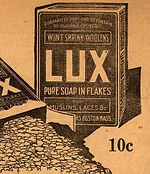Lux (soap)
This article is written like a personal reflection, personal essay, or argumentative essay that states a Wikipedia editor's personal feelings or presents an original argument about a topic. (January 2012) (Learn how and when to remove this template message) |
This article is missing information about the history of Lux in modern times. (December 2021) |
| File:LUX (soap) logo.png | |
| Product type | Personal care |
|---|---|
| Owner | Unilever |
| Produced by | Hindustan Unilever[1] Unilever Sri Lanka[2] Unilever Pakistan[3] |
| Country | United Kingdom |
| Introduced | 1925 |
| Markets | Worldwide |
| Website | lux |
![]() Search Lux (soap) on Amazon.
Search Lux (soap) on Amazon.
LUX is a global brand developed by Unilever.
Lux is marketed primarily in Brazil, India, Thailand and South Africa.[4]
History[edit]
Origins and history[edit]

The brand was founded by the firm Lever Brothers, now known as Unilever, in 1899.[5]

Advertising History[edit]
Lux Soap was introduced to America in 1925 by the Lever Brothers.[6] It was a white soap packaged in pastel colors designed to be comparable to the finer French soaps, but more affordable.[7] Once Lux Soap began its national campaign in 1926, it was also advertised for men and children.[7] The Thompson agency then began a campaign in 1928 to get endorsements from Hollywood actresses, by sending 425 actresses cases of Lux Soap. It received 414 endorsements in return, leading them to claim that 9 out of 10 stars in Hollywood use Lux Soap.[7][6]
In 1933, advertisements claimed that Lux Soap was used by 686 out of 694 more well known actresses.[8] Lux Soap's Hollywood campaign along with its many other advertising efforts, would assist Lux Soap in becoming a worldwide leader in soap sales.[6] As the focus of advertising shifted from the use of Hollywood starlets to a focus on everyday women, Lux Soap declined in sales and was removed from the shelves in the 1990s. Lever Brothers shifted their focus to another soap, Dove.[6]
Lux Soap followed Colonial Great Britain to Zimbabwe, Africa, in the 1920s, but it took until the mid-20th century before Africans became familiar with toilet soap and few used it.[9] In the 1940s Lever Brothers began mass advertising for Lux, introducing their product as a soap associated with glamour and intelligence, and began using existing advertisements of international celebrities endorsing their products.[9] Lever Brothers began to offer different colored bars other than white and used depictions of African people with slogans that insinuated intelligent people used only Lux Soap.[9] In the 1960s and 1970s Lux Soap advertising shifted back to emphasizing glamour but this time used local models and singers instead of white international stars.[9]
See also[edit]
References[edit]
- ↑ "Lux". Hindustan Unilever Limited website. Retrieved 2021-04-10.
- ↑ "Lux launches Star Soap Collection". Unilever Sri Lanka. Retrieved 2021-04-10.
- ↑ "Lux". Unilever Pakistan website.
- ↑ "Lux – personal care brand of Unilever". Archived from the original on 27 December 2010. Unknown parameter
|url-status=ignored (help) - ↑ "Our approach to sustainability". unilever.com. Retrieved 21 March 2015.
- ↑ 6.0 6.1 6.2 6.3 Ward, W. Peter (2019). The clean body : a modern history. ISBN 978-0-2280-0063-1. OCLC 1104796443. Search this book on

- ↑ 7.0 7.1 7.2 Sivulka, Juliann (2001). Stronger than dirt : a cultural history of advertising personal hygiene in America, 1875–1940. Amherst, N.Y.: Humanity Books. ISBN 1-57392-952-2. OCLC 46785266. Search this book on

- ↑ Segrave, Kerry (2005). Endorsements in advertising : a social history. Jefferson, N.C.: McFarland & Co. ISBN 0-7864-2043-X. OCLC 57515046. Search this book on

- ↑ 9.0 9.1 9.2 9.3 Burke, Timothy (1996). Lifebuoy men, lux women : commodification, consumption, and cleanliness in modern Zimbabwe. Durham: Duke University Press. ISBN 0-8223-1753-2. OCLC 33282205. Search this book on

External links[edit]
| Wikimedia Commons has media related to Lux Soap. |
